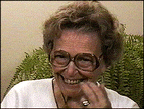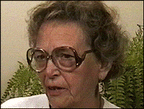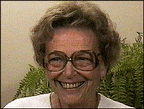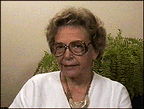![]() Listen
to Lucille share a cancer experience in her own words. (564 K .au
file)
Listen
to Lucille share a cancer experience in her own words. (564 K .au
file)

Lucille was 72 years old when she found a lump in her breast. She had always been afraid of the word "cancer", but she did not feel as devastated as she thought she might when she was told she had cancer.

Lucille found her lump during a self-breast exam. She has never forgotten that date, the 24th of April. She followed up with her primary care physician, who sent her to a specialist.

Lucille had to make treatment choices. She wishes now that she had asked more questions concerning her options, however, after her lumpectomy and radiation went well she continued on with her life.

Lucille was happy that she was able to do the things she had always enjoyed doing. She returned to her volunteer work and tried to do more to be nice to herself.
Lucille's Introduction: Why did I get it?
I have a low fat diet and we eat a lot of vegetables from our
garden. Lots of times we don't have any meat at all. I don't smoke
and I don't drink, and I never have, so why did I get it? And he said
"That's a good question. We don't know." It was something I accepted,
but there was bit of that "why did it happen to me." I have friends
who have smoked all their lives and they seem to be fine, and it
didn't seem quite fair but I didn't dwell on that. I don't think I
dwelled on that at all.
Lucille's Introduction: Women can help each other
I think that's important for one person to help another who is
going through it. When I was going through my lumpectomy and
radiation, a woman I didn't know at all (but was a friend of a
friend) called and talked to me and told me how radiation was. She
met good people there and she had a great time and all that stuff. So
that helped. And a friend of mine from Mason had a friend from her
church who had just been told she had a tumor and had a lumpectomy
(and all the things I did) and she was scared to death. So my friend
said could she call you and talk to you? I said sure. So I was able
to help her, I think, in talking to her.
Lucille's Introduction: Seeing my primary doctor
I went to my primary care doctor and I said, well, you were right.
And so we had quite a talk. He said let's see, you found this in
April. We might have had to wait until July for a mammogram if you
hadn't found it. And then he took my hand and he patted it and he
said, I know you're scared. I would be, too, to find that out. And it
was like he was identifying with me. But I almost felt like I had to
cheer him up. It's okay, you know, I'm all right. But he was very
sincere about it.
Lucille's Introduction: I wasn't devastated
I guess I'd always been afraid of that word, "CANCER," and yet I
didn't feel so devastated as I thought I might. I thought, oh well,
five years, 95% chance of living five years, which made me kind of
wonder. This may or may not be true. But I decided that the doctor's
like to use the percentages a lot.
Lucille's Introduction: My husband needed support
He didn't say much. He kind of, well, he's been very supportive,
but he doesn't handle things like this very well. He'll do all the
things he can to help you out, you know, all the material little
things, but he doesn't talk about it much. But, he told all the
neighbors before I had surgery and I didn't know that he'd told them,
but I think he was looking for support.
Lucille's Introduction: I wrote a journal
So I kept a log of this experience I've had. I entitled it
"Cancer" in great big letters. And I started out with finding the
lump and I told about how I felt about the doctor telling me in the
manner that he did. And I went through the radiation and how I felt,
and people who came, things people said. A friend of mine gave me a
little suncatcher that said "When life gives you scraps, make
quilts", and I thought that was delightful. And different little
things that people had done for me I tried to record that. Some
people knew I was writing, but not everyone.
Lucille's Introduction: My son cooked for us
David is... he's like his father, he doesn't like to talk when
things aren't quite right, he doesn't like to get into it. Maybe its
male, maybe its my males that I know, but David is a cook. I mean, he
really likes to cook and bake, and so when he came home this summer
he cooked all the time. He just made wonderful things for us. That
was great. But I know that he was having trouble.
Lucille's Introduction: My daughter's were concerned
I felt sorry for my daughters because they were wondering,
worrying and concerned, and the one daughter went to have her
mammogram away and so did the second daughter then. They all did, all
three went in a reasonable length of time.
![]() Return
to Lucille's Outline
Return
to Lucille's Outline
Lucille's Diagnosis: I found a lump
I periodically examined my breasts, not faithfully. I'd had a
mammogram the summer before and wasn't due for a yearly until the
next July. After I had a shower this one morning, the 24th of April,
I put my arm up behind my head and I could see a dimpling. And I felt
there and there was this hard little lump, but I kind of dismissed it
and thought well, I'll wait until Monday and see my gynecologist. So
I did that and he said this moves around enough so that I don't think
its cancerous. But since it feels different to you than anything else
you've felt, I think you probably should make an appointment with the
surgeon.
Lucille's Diagnosis: He said the word
And I went to see this doctor. He was abrupt and insensitive at
the time, I thought. I said "It's right there." And he said, "Oh,
well, it feels very suspicious of cancer." And I don't think I heard
much that he said after that. And he said "I'll have to take a needle
biopsy though to be sure," so he took the needle biopsy. And then I
sat up on the end of the table and I just lost it, and the nurse
tried to console me with, Oh honey, you're all right. He's such a
good doctor. He does this all the time. You don't have anything to
worry about. And I thought, yeah but he said "cancer," that word. And
I was alone, I drove home and cried a little bit and thought well
this is crazy. I was getting into an accident with the tears and I
dried them up and then I'd cry a little bit more.
Lucille's Diagnosis: Ninety-five percent chance of living five years
So, we went in. I took my husband with me that time, and the
doctor said "Well, you have 95% percent chance of living five years."
Nothing to worry about. But I felt well, that's just his way of
saying things. And so we scheduled the surgery for the 14th of May
and they did a lumpectomy and they took, I think, seven nodes and
there were not involved, so I had stage one cancer.
Lucille's Diagnosis: The needle biopsy didn't hurt
I asked him "Will this hurt?," and he said "Oh no, it will just be
like a mosquito bite." They always say that and I don't know why. And
it didn't hurt. He didn't put the needle in very far. I think this
cancer was right close to the surface.
![]() Return
to Lucille's Outline
Return
to Lucille's Outline
Lucille's Treatment: Radiation or mastectomy
He said "Now you can have either radiation or a mastectomy." He
said this sort of like you'd might say you can go park your car here
or there. And I thought well why would I want a mastectomy if I've
already had the lumpectomy. And I think he meant if you want a
mastectomy then we won't do radiation there, go right to chemo. I
didn't question it and I guess I should have. And he said "We are
going to give Tamoxifen and you won't have chemotherapy because the
tumor was especially attractive to estrogen." This Tamoxifen is sort
like a chemotherapy that you take orally, I guess. I don't understand
it
Lucille's Treatment: The lumpectomy went well
I had the surgery and they did a lumpectomy and they took I think
seven nodes and they were not involved. So I had stage one cancer. I
was in the hospital overnight and I wore a JP drain which is a drain
that after the nodes are taken, that drains, and you wear it down
here. And then I'd have to measure that every night to see how much I
was getting out of it. It healed up really well. He was pleased with
the way it healed up.
Lucille's Treatment: Not a lot of pain
I didn't have a lot of pain, no. Especially the incision in the
breast didn't hurt. I was more uncomfortable with the arm where the
nodes had been taken than I was with the breast. I had followed the
exercises that they tell you to do. And I didn't have much trouble
with doing the things I was supposed to do. I think I got along
remarkably well.
Lucille's Treatment: They made a special mold
Radiation? It was not a bad experience at all. First they build
this contraption for you and it looks like a plastic bag that they
fill with chemicals and then that hardens and they me lie on that.
That is the way you have your radiation, the position they get you
in. Well, they weren't happy with it. This was supposed to take an
hour and a-half and it took me three hours in that room, because they
kept saying "Oh no, we're getting too much lung." And I was so
impressed with how careful they are. And so they made another big
thing and turned me and got exactly what they wanted. And everybody
just seemed so concerned and thoughtful.
Lucille's Treatment: Radiation became routine
Radiation, that got to be very routine. I went every morning at
8:30 and I was home before 9:00. I counted and it was 40 seconds in
two places, and they marked me all up with magic marker. I had big
marks all the way around where they had to place this. They'd say
"Now don't wash too much." And you aren't to wear any deodorant, or
any powder, or any perfume, anything that can affect the radiation, I
guess. I would feel very tired after radiation. Not like some people
who couldn't pick up a fork, but I was tired enough so that after two
or three hours if I went anywhere or did anything unusual I would be
quite tired.
Lucille's Treatment: Radiation wasn't what I expected
When I read the little booklet and it said radiation can be six
weeks, I said to my husband, "I'm not going to go some place for six
weeks for radiation." But then, it wasn't what I thought it would be
at all. And there would be several women in this little group, you
know, and you'd see the same ones every day because, and how you
doing and they were nice to each other. Well, at seven weeks because
the last week they give you heavier radiation right on the scar. Then
every week you see the doctor, and every week you have a blood sample
taken for platelet count and so forth.
![]() Return
to Lucille's Outline
Return
to Lucille's Outline
Lucille's Recovery: I don't worry much
As far as thinking oh, boy, what if the other breasts gets
infected, and what if this, this, and this, I don't think that way
very much. I guess I feel like I'm old enough so that if I go its not
any great catastrophe. I have my, you know, the kids are all taken
care and my husband's pretty resourceful, and yet I can't have that
attitude too much because that's self-defeating.
Lucille's Recovery: I volunteer at the hospital
I work at the hospital in the gift shop and I enjoy that a lot.
And I thought, well, maybe I should go down and volunteer to work in
the radiation section because I felt like they were so helpful. And I
thought, well, why do you think you ought to do this? And then I
thought, I don't know that I need to do that. I'm not sure that I
need to. If they ask me, I know I'd say yes.
Lucille's Recovery: I want to stay on top of this
I want to stay on top of this thing. I don't want to sit back and
let things happen and no do anything about it. I will have seen six
doctors this month. I had a check-up in March with a mammogram on
just the one breast, and then I had a double one this month. So about
six months ago I had the mammogram.
Lucille's Recovery: My prognosis is good
Chances are you have this cancer, you've had it out, you'll have
radiation and you'll never have cancer again anywhere else in any
part of your body. So he gave me a very good percentage on this
article. I can't say that I really fear it popping out somewhere
else. It may, but I don't think about that.
Lucille's Recovery: I can do what I want to do
I thought when I left, gee, I wonder if I'll be able to do all I
want to do, and I was able to and I was really happy about that. That
made me feel good. We don't do a lot of going away, but we're going
next month, so we're down in North Carolina. I do a lot of things
that I really want to do around town. I was still able to do what I
wanted to do.
Lucille's Recovery: I've thought about meditation
But I thought about it the other night at the support group. They
had a man talk about imagery, and they had us go to Lake Michigan,
and I was able to do that quite easily. I thought I probably ought to
do more meditation. I think it's probably helpful. I found a lot of
reasons not to do things that I didn't want to do because of this. I
think I used it sometimes, and that's okay, I'm quite sure.
Lucille's Recovery: Talk to people who have been there
I think if a person has friends or a support group of some kind,
it helps. Talk with people who have been through it. People dropped
in that week after I got home from surgery who I didn't know had ever
had cancer, or mastectomy, or anything, and they came and they said I
had one thirty-five years ago this one girl said. And she's doing
fine. Another one said I had a radical mastectomy twenty-five years
ago and here I am. And that, I think, was more helpful than almost
anything. So be open to all kinds of information.
![]() Return
to Lucille's Outline
Return
to Lucille's Outline